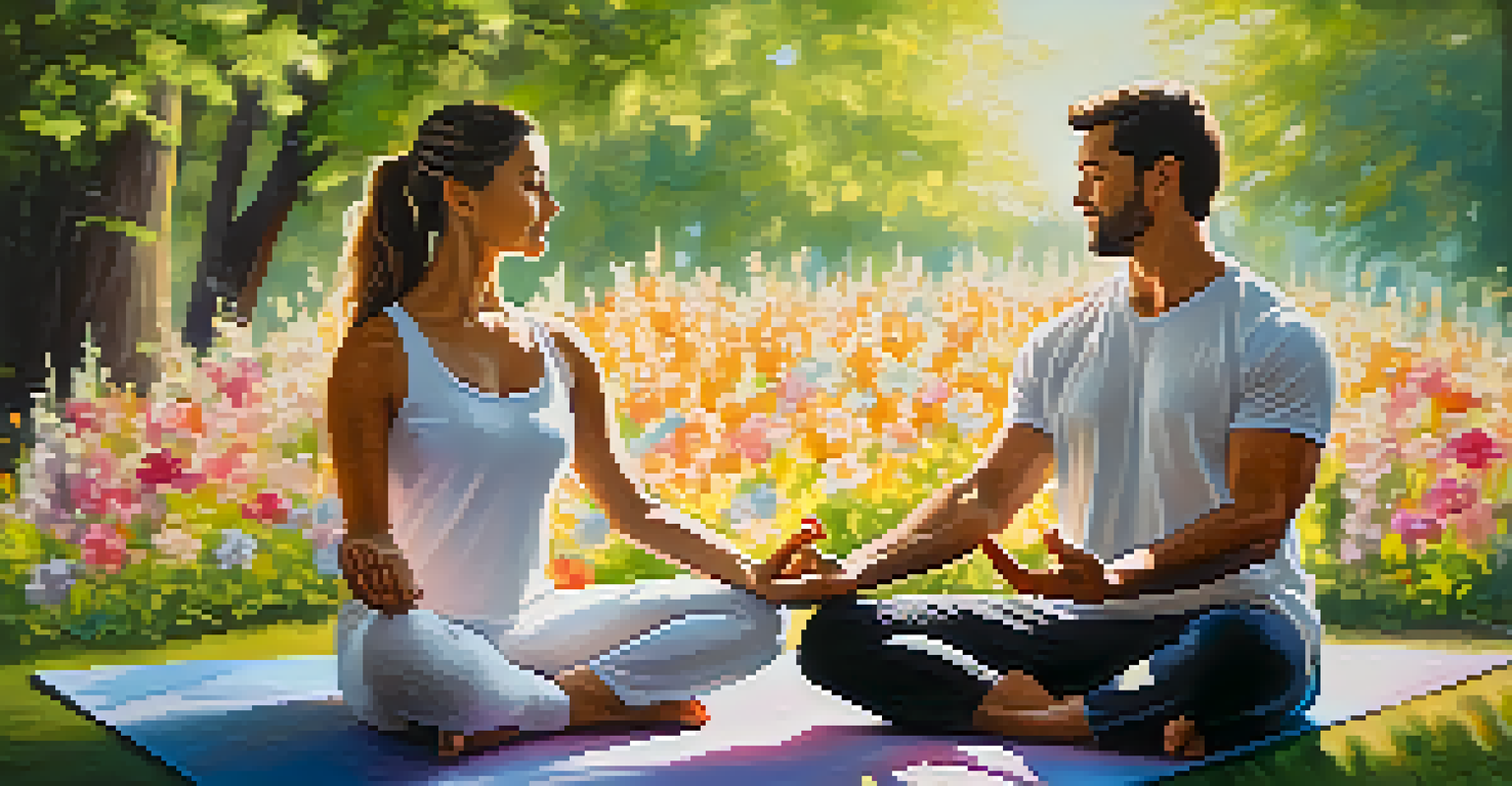The Impact of Yoga on Building Trust in Relationships

Understanding Trust: The Foundation of Relationships
Trust is often considered the cornerstone of any healthy relationship, whether it’s romantic, familial, or platonic. It involves feeling safe and secure with another person, allowing for vulnerability and openness. When trust is present, communication flows more freely, paving the way for deeper connections.
Trust is built with consistency.
However, building trust takes time and effort. It requires consistent actions that demonstrate reliability and honesty. By understanding what trust truly means, individuals can work towards enhancing it within their relationships.
This is where practices like yoga come into play, as they can help individuals cultivate qualities that foster trust, such as patience, self-awareness, and empathy. As we explore the impact of yoga on trust, we can see how it nurtures an environment of safety and support.
Yoga: A Pathway to Self-Discovery and Awareness
Yoga is not just about physical postures; it's a holistic practice that encourages self-exploration and mindfulness. Through yoga, individuals learn to tune into their bodies and emotions, gaining a deeper understanding of themselves. This self-awareness is crucial in building trust with others, as it allows for genuine interactions.

When you understand your own feelings and motivations, you can better communicate your needs and boundaries to those around you. This clarity helps to eliminate misunderstandings, a common barrier to trust. For example, if you're aware of your triggers, you can express them beforehand, fostering a more trusting environment.
Trust is Key in Relationships
Building trust is essential for deeper connections, requiring consistent actions that demonstrate reliability and openness.
Moreover, the mindfulness cultivated through yoga can significantly enhance emotional regulation. This means you’re less likely to react impulsively in challenging situations, which can often lead to conflicts and eroded trust.
Enhancing Communication Skills Through Yoga
Effective communication is vital for trust in any relationship. Yoga encourages mindfulness and presence, which can translate into how we listen and respond to others. When we practice being fully present on the mat, we can bring that same focus into our conversations off the mat.
The practice of yoga brings us to the present moment, the only place where life exists.
For instance, practicing breath control during yoga can teach us to pause and breathe before reacting in a conversation. This pause can be powerful, allowing us to choose our words more thoughtfully. Such mindful communication fosters a deeper connection and promotes trust.
Additionally, yoga often emphasizes non-judgment and acceptance, which are key components of healthy communication. When partners feel accepted for who they are, trust naturally flourishes.
The Role of Vulnerability in Building Trust
Yoga inherently involves a certain degree of vulnerability. As we stretch and challenge our bodies, we confront our limitations and insecurities. This willingness to be vulnerable can extend into our relationships, encouraging openness and honesty.
When both partners are willing to share their vulnerabilities, it creates a safe space for trust to grow. In yoga, sharing challenges or fears with a class can feel liberating, and that same spirit can be brought into personal relationships. It strengthens bonds when both partners know they can be their true selves without fear of judgment.
Yoga Enhances Self-Awareness
Practicing yoga fosters self-discovery and mindfulness, which helps individuals communicate their needs and establish trust.
For example, sharing a fear or insecurity during a yoga class can lead to deeper connections with fellow practitioners. Similarly, sharing personal struggles with a partner can lead to a more profound level of intimacy and trust.
Creating a Supportive Environment Through Yoga
Yoga classes often foster a sense of community and support among participants. This environment encourages individuals to cheer each other on, which can translate to personal relationships. When we feel supported, trust naturally flourishes.
As we engage in yoga, we learn to celebrate each other's progress, no matter how small. This camaraderie can help individuals feel more secure in their relationships. Knowing that you have a partner who supports you unconditionally can significantly bolster trust.
In essence, the supportive environment created in yoga classes exemplifies how trust can be built in relationships. When partners actively support each other's growth, they lay a solid foundation for trust.
Mind-Body Connection: Building Trust with Yourself
Yoga emphasizes the mind-body connection, helping individuals cultivate a deeper relationship with themselves. Trusting yourself is just as important as trusting others. When you build self-trust, it positively impacts how you interact with those around you.
For instance, regular yoga practice can help you learn to listen to your body and honor its needs. This self-respect translates into how you treat others, fostering an atmosphere of mutual trust. If you respect your own boundaries, you’re more likely to communicate those boundaries to your partner.
Supportive Environments Build Trust
Creating a supportive atmosphere, like that found in yoga classes, encourages individuals to celebrate progress and strengthen trust in relationships.
Moreover, building self-trust enhances your confidence, which can empower you to express your feelings openly. This clarity in communication is essential for nurturing trust in any relationship.
Yoga: A Tool for Conflict Resolution in Relationships
Conflicts are a natural part of any relationship, but how we handle them can either build or break trust. Yoga can provide tools for managing conflicts more effectively. The mindfulness techniques learned in yoga can help individuals approach disagreements with a calm and open mindset.
For example, practicing yoga may teach you to breathe through frustration, allowing for a more measured response. Instead of reacting impulsively, you can take a moment to collect your thoughts and respond thoughtfully. This approach can prevent conflicts from escalating and protect the trust you've built.

Additionally, yoga encourages a sense of empathy and understanding. When both partners approach a conflict with compassion, it becomes easier to find common ground and resolve issues without damaging trust.
Conclusion: The Lasting Impact of Yoga on Trust
In conclusion, yoga serves as a powerful tool for building and sustaining trust in relationships. From enhancing self-awareness to improving communication skills, the benefits of yoga extend far beyond the mat. The practice encourages vulnerability, empathy, and support, all essential elements for nurturing trust.
As individuals embrace the teachings of yoga, they can develop deeper connections with themselves and others. This journey not only strengthens personal relationships but also fosters a sense of community and belonging.
Ultimately, incorporating yoga into your life can lead to richer, more trusting relationships, enhancing your overall well-being and happiness.